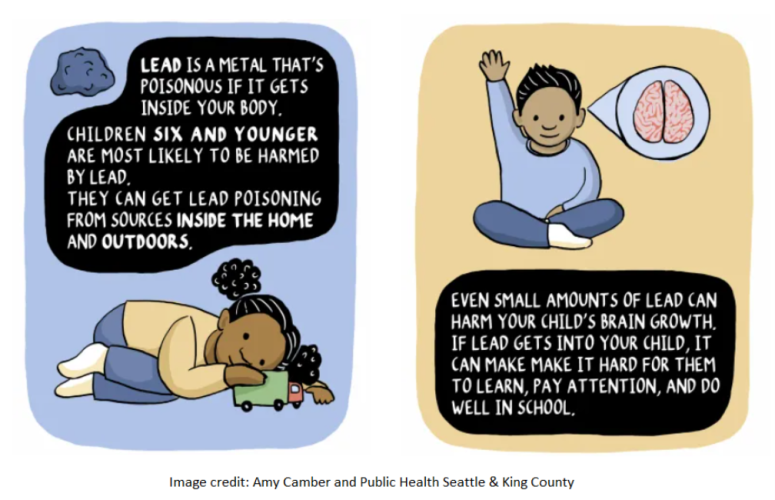
Who is at risk for lead exposure?
While lead is a naturally occurring metal, exposure to lead is a serious health risk to children who are under the age of six. The Hazardous Waste Management Program is joining organizations and groups nation-wide to bring attention to the dangers of lead exposure and poisoning during National Lead Poisoning Prevention Week, Oct. 25-31.
Children are typically exposed to lead from lead-based paint in homes built before 1978 and old toys that are painted or metal. They can also be exposed to lead from some traditional cookware, cosmetics, and remedies or medicines. Some of the harmful effects of lead exposure in children include learning disabilities, nervous system damage, decreased muscle and bone growth, and behavior issues.
Services to help prevent lead exposure in King County
Our Residential Services Program (RSP) provides lead prevention services to communities in King County. “Some of the services we offer include phone consultation, lab sample collection, and limited product screening for lead,” shared Matt Wilson, RSP team member. The team has recently shifted to virtual tools to continue their critical outreach and education work during the pandemic. “We are all in our homes far more often, far longer, now due to the pandemic. Getting education and services about lead exposure prevention to families has never been needed more,” Matt said.
If you have a child under the age of six and live in a home built in 1978 or earlier, consider participating in our Lead Pilot Project. King County public health staff will help families identify potential sources of lead in their homes and develop recommendations to reduce a child's lead exposure with the child's caregiver.
If you are interested in participating in the Lead Pilot Project, please email Joyce.McCraney@kingcounty.gov or call 206-263-1945.
Actions you can take to keep your family safe
Lead can be a hidden danger. Here are tips from RSP for how to keep your family safe and healthy:
- Wash hands and toys with soap and water. Lead dust can be found on toys, windowsills, and the floor. When children touch these things and put their hands in their mouths, they accidentally swallow lead dust.
- Damp dust and mop once per week. Use a damp towel and mop with soap and water to cut down on the lead dust that can be in your home. Do not sweep with a broom because that can spread harmful dust into the air and onto more surfaces. Read our lead dust cleaning flyer for more information about damp dusting and mopping.
- Have your child’s blood tested for lead. Talk to your health care provider about whether your child should be tested for lead poisoning. There is no safe level of lead in a child’s blood. Learn more about lead testing at the Department of Health’s website.
- Leave shoes at the door, or wipe shoes on a doormat. Lead exposure can come from soil (brought into the house by shoes) that has been contaminated by lead dust or lead paint.
- Feed your child foods that are rich in calcium, vitamin C, and iron. A nutritious diet can help reduce the absorption of lead and lower its harmful effects.
Do you want to share information about preventing lead exposure with your community or family? We have informational flyers available in eight languages! Visit our Document Library to download a flyer.
Learn more about National Lead Poisoning Prevention Week on the U.S. Environment Protection Agency’s website.
Image credit: Amy Camber and Public Health Seattle & King County